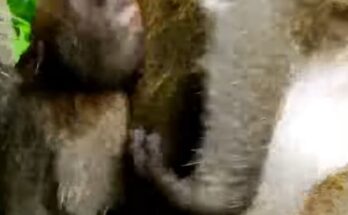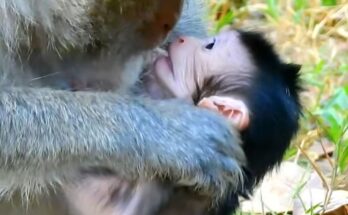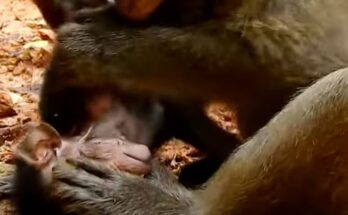The animal kingdom is often a place of wonder and beauty, but it also holds stories of struggle, survival, and heartache. One such poignant tale is that of a poor little baby monkey who was abandoned by its mother. This heartbreaking scenario sheds light on the challenges that some animals face in the wild and the complex dynamics of animal behavior.
The Bond Between Mother and Baby
For most primates, the bond between a mother and her baby is among the strongest in the animal world. From the moment a baby monkey is born, it relies entirely on its mother for nourishment, protection, and emotional security. A mother monkey’s nurturing and care are essential for the survival and development of her offspring. This bond also lays the foundation for the baby’s social skills, teaching it how to interact with other members of its troop and navigate the world around it.
However, in rare cases, this bond can be disrupted. When a mother abandons her baby, the consequences can be devastating. Such situations may arise due to various factors, including the mother’s health, environmental pressures, or disruptions in the troop’s dynamics.
Why Do Mothers Abandon Their Babies?
While it is heartbreaking to witness, abandonment in the animal world is often a matter of survival. A mother may abandon her baby if she feels unable to provide adequate care or if the baby is weak, ill, or unlikely to survive. In some cases, environmental stressors such as food scarcity or threats from predators may compel a mother to make the difficult decision to prioritize her own survival or that of the rest of her offspring.
Social dynamics within a monkey troop can also play a role. In highly hierarchical groups, lower-ranking mothers may experience stress or aggression from dominant individuals, which can lead to neglect or abandonment of their young. Additionally, young or inexperienced mothers may lack the skills or confidence to care for their firstborn, resulting in unintentional neglect.
The Challenges Faced by Abandoned Baby Monkeys
An abandoned baby monkey faces numerous challenges. Without its mother’s warmth and milk, it is vulnerable to starvation, dehydration, and hypothermia. The absence of maternal protection leaves it exposed to predators and other dangers. Moreover, without guidance, the baby may struggle to learn essential survival and social skills, which are typically acquired through observation and interaction with its mother and other troop members.
In some cases, other members of the troop may step in to care for the orphaned baby, a behavior known as alloparenting. This act of compassion can provide the baby with a second chance at survival, but it is not always guaranteed. The willingness of others to adopt or assist depends on the troop’s dynamics, the baby’s condition, and the availability of resources.
Hope Through Human Intervention
In situations where an abandoned baby monkey is discovered by humans, wildlife rescue organizations often step in to provide care. These organizations play a critical role in rehabilitating orphaned monkeys, ensuring they receive the nutrition, medical attention, and emotional support they need to thrive. Caregivers often mimic the nurturing behaviors of a mother monkey, including feeding, grooming, and offering comfort.
The goal of these interventions is typically to prepare the baby monkey for eventual reintroduction into the wild. This process involves teaching it essential survival skills and gradually reducing its dependence on humans. However, reintroduction is a complex and challenging process, as the monkey must learn to navigate the social structures of a troop and adapt to its natural environment.
A Lesson in Empathy
The story of a poor little baby monkey abandoned by its mother is a powerful reminder of the fragility of life in the animal kingdom. It also highlights the importance of empathy and compassion in both humans and animals. Witnessing such struggles inspires many to support conservation efforts, protect natural habitats, and promote understanding of the challenges faced by wildlife.
While the plight of an abandoned baby monkey is undoubtedly tragic, it also serves as a testament to the resilience of life. Whether through the kindness of other animals or the intervention of compassionate humans, there is always hope for a brighter future for these vulnerable creatures.
Conclusion
The abandonment of a baby monkey by its mother is a heartbreaking event that underscores the harsh realities of survival in the wild. However, it also offers a glimpse into the resilience of these animals and the capacity for compassion within the animal kingdom and among humans. By understanding and addressing the challenges faced by wildlife, we can work towards creating a world where even the smallest and most vulnerable creatures have a chance to thrive.


